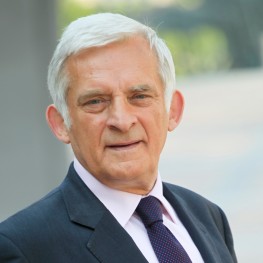Jerzy Buzek
Prime Minister of Poland (1997–2001) President of the European Parliament (2009-2012)
Born July 3, 1940 in the city of Śmiłowice in the Cieszyn Silesia region, which now belongs to the Czech Republic.
Hi is a member of the European Parliament since 13 June 2004.
After graduating from the Juliusz Słowacki High School in Chorzów in 1957 Jerzy Buzek became a student of the Mechanics – Energy Faculty of the Gliwice Institute of Technology. He graduated in 1963. That same year Buzek started working in the Polish Academy of Sciences Chemical Engineering Institute in Gliwice. He was awarded a Ph.D in 1969. 1970s saw Jerzy Buzek devoting himself to academia and science. In 1971 he held an internship at the University of Cambridge. A decade later, his focus shifted to environmental protection. During this time, Buzek was a respected lecturer at the Silesian Institute of Technology in Gliwice and at the Opole Institute of Technology. He eventually earned the title of professor of technical sciences.
September 1980 was the year Jerzy Buzek got involved with Solidarity. He was elected the chairman of the trade union’s branch at his workplace. A year later Buzek went to the Solidarity’s First National Delegate Assembly. His prominence in the union grew. He chaired the fourth, fifth and sixth Assemblies. He escaped incarceration on December 13th 1981 and went underground to become the publisher of the illegal „S” bulletin. Its first issue was already out in early 1982. A serious illness of Agata, Buzek’s daughter, made him quit underground activism. After Solidarity’s victory in 1989 he once again devoted himself to science.
In the late 1990 Jerzy Buzek founded the annual Pro Publico Bono competition for the best social initiative in Poland. In the years 2002 – 2004 he was the prorector of the Polish Diaspora Academy in Częstochowa. Buzek also founded the Polish Diaspora School of Diplomacy and the Family Foundation.
February 1997 found Jerzy Buzek coordinating a team of economy experts working for the Solidarity Electoral Action (SEA) party. The platform was one of the key elements in the party’s a victorious electoral campaign later that year. Buzek made his way into the Polish parliament and was put forward as the new prime minister. He took the post on October 31st and held it for a full term until October 19th 2001, first person to do so after 1989. Buzek led Poland’s way into NATO and negotiated the country’s accession to the European Union. His coalition government undertook one of the most difficult reform efforts after 1989. It initiated and oversaw the implementation of the reform of the local government, pension system, health care, education and mining. As prime minister Jerzy Buzek also initiated the creation of the Strategic Oświęcim Government Programme, which is aimed at transforming the city of Oświęcim into an international center for education on human rights. A similar project is the Oświęcim Academy, which is preparing the Pawel Wlodkowic School of Culture and Human Rights educational project in cooperation with the Jagiellonian University. Jerzy Buzek was the first Polish prime minister to take part in the March of the Living alongside Israel’s prime minister Benjamin Netanyahu in 1998, making this an important step in promotion of this initiative. In January 1999 Buzek took the post of the chairman of the Social Movement SEA. Yet, he retired from active politics after the party suffered a devastating defeat in the 2001 election.
Professor Buzek’s skills and personality along with experience gathered during the time he served as the Polish prime minister contributed to his election for the post of the President of the European Parliament on July 14th 2009. He won 555 of 644 available votes, making this the highest margin since direct elections to the Parliament had started in 1979. More importantly, he was the first President of the institution hailing from the Eastern European member states. In the speech after his election Buzek outlined the priorities of his presidency: promotion of the European energy community, promotion of democracy and human rights, strengthening the cooperation with EU’s neighbors in the East and South, strengthening Europe’s role in a multipolar world, a long term EU budget responsive to the needs and ambitions of the enlarged Union, preparing the European Parliament for its enhanced role after the implementation of the Treaty of Lisbon.

